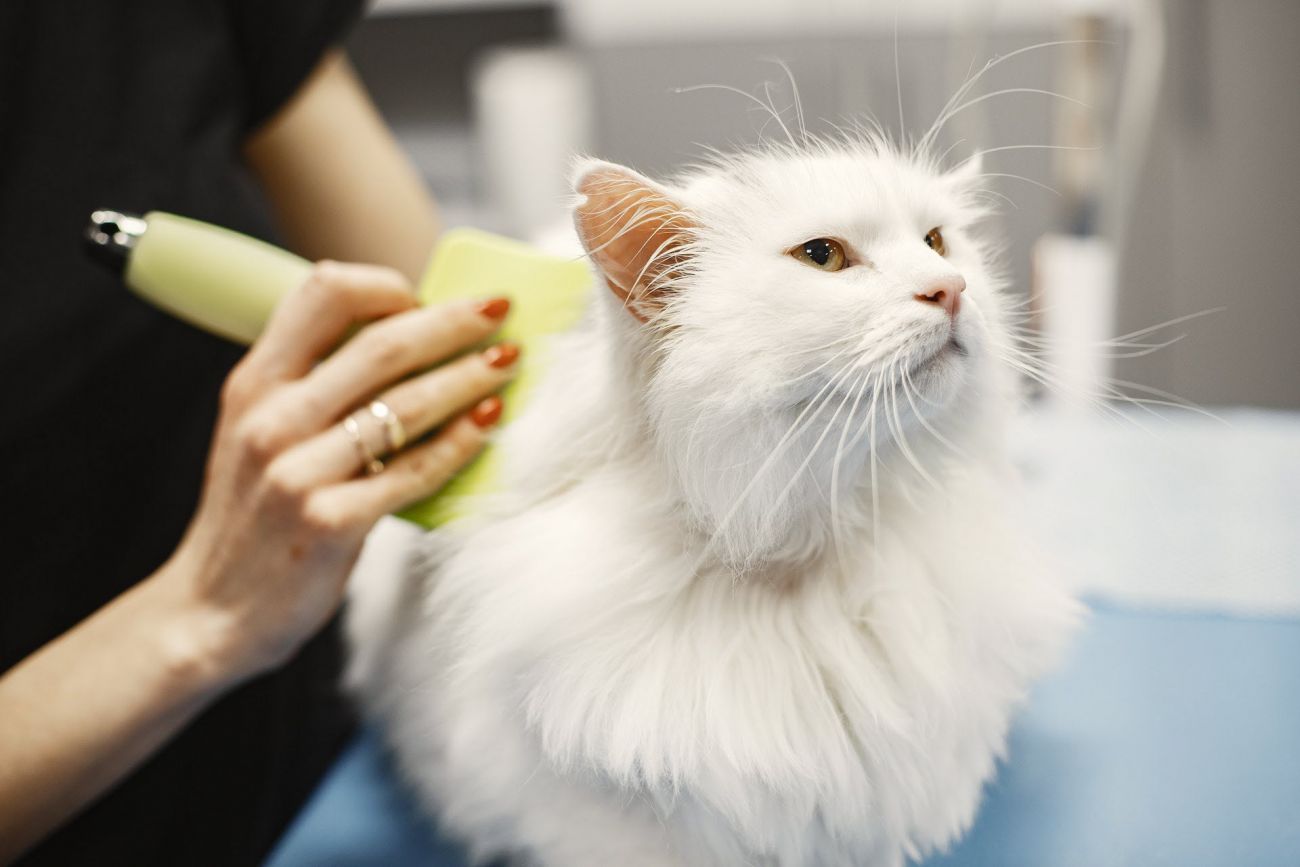7 Pet Business Ideas to Turn Your Love of Animals into a Career

First Financial Bank
During the COVID-19 pandemic pet adoption rates increased at a staggering rate. Now, with an estimated 70% of US households with at least one pet, the need for pet care and services has never been greater. If you have a love for animals and are looking to start your own business, look no further than the pet industry. Here are seven potentially profitable pet business ideas to consider.
Pet sitting
Pet sitting is when you care for a client’s pet while the client is away. This includes feeding the pet, taking them for walks, cleaning the litter box, and other daily needs. Pet sitters may stay overnight at their client’s home, especially if you are sitting for dogs. For cat sitting, you may just come in for specified amounts of time every day. Depending on your business relationship and setup, some clients may be comfortable with their pet staying at your place instead. It’s also common to combine your pet sitting business with a dog walking service, since many clients will need both consistently.
Pet sitting is one of the best pet business ideas because it’s needed almost anywhere and the market continues to grow. According to Grand Review Research, “The global pet sitting market size was valued at $2.6 billion in 2019 and is expected to grow at a compound annual growth rate of 8.7% from 2020 to 2027.”
No formal training is needed to be a pet sitter, but it’s important to have a thorough understanding of how to care for animals and have prior hands-on experience doing so. Knowledge of animal CPR and first aid is a good idea.
Pet boarding
An alternative to in-home pet sitting is boarding – sometimes referred to as a pet hotel, kennel or doggie daycare. Pet boarding facilities house, feed and entertain pets while their owners are away, whether it’s for a few hours or several days at a time.
An estimated 30 million pet owners board their pets every year. And with only about 9,000 kennels in the US and Canada, there’s certainly a need for more boarding facilities. Most boarding kennels offer services to dogs and cats, but some may also board birds, reptiles, and other less common pets.
The professionals working at a pet boarding facility should be well trained in pet care with backgrounds like veterinary, grooming, or pet training. You’ll also need to have your facility meet the necessary requirements for your town, city, state or county for a pet care facility.
Dog training
Dog training helps pets and their owners learn and maintain good pet behavior. It’s more than learning to sit or heel. Dog training focuses on how both the pet and their people interact properly when they are with other animals and humans; how the pet should be rewarded to reinforce appropriate behaviors; and how to instill discipline. The dog training business can be very flexible; you can train dogs in the park or even go to the owner’s home. Sometimes training is offered at boarding facilities as well, so you may consider combining both of these dog business ideas if legal and zoning requirements allow.
The US dog training market has seen an increase as a result of the pandemic and is expected to reach $820 million by 2026. Dog training may even be a good online pet business opportunity, providing virtual training to owners and their pets. This opens the door to more clients and allows you to offer a unique service that other trainers don’t.
If you’re not already certified in pet training, that is a good first step to starting your pet training business. Not only will it help give you credibility with clients, but you’ll be exposed to different training styles and learn how to communicate with pets and their owners in a successful way.
Dog walking
Dog walkers are hired to take their clients’ dogs out of the house for exercise and are responsible for the safety of the pets during that time. Dog walking can prove to be a profitable pet business. It’s common to walk multiple dogs at a time and price each walk based on the length of time. You may also consider charging more if it’s a private walk.
With many people going back to the office and starting to travel again, the need for dog walkers is rising. Dog walkers can choose to work through companies like Rover, or start off on their own to build a client base.
No formal training is required to be a dog walker, but it’s important to have a love of dogs and a thorough understanding of how to handle multiple dogs at a time in public. Similar to pet sitting, knowledge of animal first aid may also come in handy.
Pet grooming
Pet groomers are trained in maintaining a pet’s fur or hair, which is important for their health and hygiene. This job also involves clipping the pet’s nails, cleaning their ears, and brushing their teeth. Most pet owners don’t know how to groom their pet correctly and prefer to pay a trained professional to do it. Pet grooming is typical among dog owners, but some cat owners choose to get their pet groomed as well.
With 89.7 million dogs in the US and nearly 104,000 pet grooming businesses across the country, this business has an average growth rate of more than 8%. If you’re interested or have a background in pet grooming, now may be the time to start your own business.
A career in pet grooming doesn’t always require formal training or schooling, but it is highly advised. You may consider courses at a vocational school to help build your knowledge, confidence, and skillset. You may achieve a certificate through one of these schools, which is different from being licensed. You will also be required to obtain specific licensing and permits in order to start a pet grooming business, even if it’s out of your own home – so check for the requirements in your area as you make plans.

If you have a love for cooking, baking, and pets, the pet food business may be for you. The pet food business is booming. In 2019 alone, US pet owners spent $36.9 billion on pet food and treats. More than ever, people are paying attention to what’s in the food they feed their pets, and they’re willing to pay extra for quality.
Your business could take many different forms—from pet treat bakery to cat food subscription service. The most important thing to know about starting a pet food business is that it is highly regulated by state and federal governments, which means you need to do a fair bit of research before you can start selling. Still, this is a great online pet business opportunity; you could make the food or treats at your home and have an online store to manage sales.
While it’s not required that you have formal training to start a pet food business, it’s important to have prior experience, thorough understanding of the industry and pet food regulations, and an understanding of animal nutrition. Your state most likely will also require you to register your products and/or license your company before selling your food or treats.
Pet supplies
A pet supply store is a true retail experience with clothing, toys, collars, leashes, beds, scratching posts, and more. You could have a brick-and-mortar store or an online business. Think of how you could offer something unique to your clients that other large pet supply stores don’t. Maybe you combine pet supplies with a pet bakery or offer pet sitting services on the weekends.
It’s estimated that in 2021, US pet owners will spend $23.4 billion on pet supplies. And with more pet adoptions than ever, the need for pet supplies is inevitably growing.
You don’t need any formal training to start a pet supplies store, but it’s important to be educated on business requirements and documentation, like forming a legal entity, registering for taxes, and for physical stores, obtaining a certificate of occupancy.
Getting started
You know the old adage “try before you buy”? It’s true for starting a pet business. If you love animals but haven’t actually been a pet sitter, groomer, etc., take a part-time or volunteer job doing the work. The experience can help you finetune what you want your business to be like – and avoid investing in something that isn’t a fit for you.
And your pet business should be treated like any other business venture: you need to research the market demand and competition in your area, understand legal and zoning requirements, create a comprehensive business plan and work with your trusted advisors to make the best choices for you. But with one in five households acquiring a pet since the beginning of the pandemic, the industry is growing rapidly. Now may be the time to make your pet business idea come to life.

Pamper Your Clients with These Luxurious Pet Spa Services

Owning a Pet Resort: Is the Pet Services Industry Right For You?

How to Start a Pet Boarding Service

